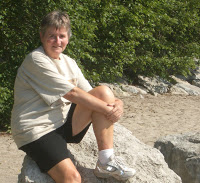In my early days of working for IBM, on the bottom rung of the jobs ladder, I had a sign hanging by my workstation. It read,
I FEEL MUCH BETTER NOW THAT
I’VE COMPLETELY GIVEN UP HOPE.
I don’t know why I found this so amusing, but I did. Of course, as soon as I advanced to the next rung of the ladder I had to trash it, but I and my co-workers enjoyed it at the time – indeed it became quite a catch phrase for a while.
Perhaps it seemed funny at the time because I was, then, so far from giving up hope. I was full of hope and dreams. It was 1966; the midst of the swinging sixties with their promise of change and freedom. I was twenty-four and had a job which paid more than I had ever dreamed of making – eighty-four dollars a week. My future was awash with wonders! I was not to be disappointed. My life became awash with wonders, as it still is.
But the words from that silly little sign have never left my head. They pop up from time to time. There are certain circumstances when I find them to be true. Hope is not always your best friend; certainly not when it morphs into denial. On one visit to England to see my parents, I noticed a certain confusion of thinking in my dad. Oh well! I shrugged it off. He was, after all, in his seventies. It was only to be expected. (He was, of course, the age I am now – something else I would rather not think too much about.) Filled with false hope I returned to Colorado, only to be summoned back across the Pond after a few months, to deal with the reality of Dad’s dementia, which had worsened rapidly. My mother and I were both forced to abandon our hopes that he could remain at home and I set about learning my way through the bureaucracy of the British National Health Care System. I felt much better then, having abandoned all hope. Dad ended up in a facility for those with dementia in what was once the work-house in a local town. It was a very grim-looking building, but inside they had done everything possible to make it bright and cheerful, and the staff was wonderful. And it was free. I don’t think Alzheimer existed back then, and we didn’t have the knowledge of dementia which, sadly, we do now, but I knew enough to know there was no hope; that he would only get worse. The next, and last, time I saw him, he had no idea who I was. That was hard, but nothing like the shock it would have been had I been harboring false hopes.
One of my stepsons suddenly developed juvenile diabetes when he was eleven years old. Out of the blue, no more Xmas cookies, no birthday cake, no more of most of the food he loved. On top of that came the prospect of having to give himself an insulin injection every day of the rest of his life, and having constantly to measure and adjust his sugar levels. He cried. He raged. He threw things. He punched out at any of us who tried to hold him. Then suddenly, after a few crazy days, everything changed. He had given up hope and accepted his new reality. Of course he was not happy about it, but he had stopped fighting it. He is now retired from a lifetime at the post office, living happily in Nevada with his wife and large extended family. He told me once that the only time his diabetes really upset him was on a few occasions when he heard of the possibility of some big medical breakthrough, and felt a surge of new hope only to have it dashed. He had learned that hope was better avoided.
I have known people, and heard of many more, who, on receiving the terrible diagnosis of a terminal illness, were able to be at peace with it once they truly accepted that there was no hope. That is really living in the now, as our spiritual teachers would have us do. Hope is one of many things which prevent our doing that. We can never be fully in the present moment if we are forever dwelling in hopes and dreams of some future moment.
On the other hand, hopes and dreams of that better future can help those who see nothing to be grateful for in their ugly now. We recently watched a TV program, doubtless on PBS, about children growing up in poverty in this country. It was striking how many teenage boys found an incentive to stay in school, and more than that, to do well in their studies, because they hoped to get a football scholarship to college and go from there to professional football. It offered them at least a hope of a way out. What happens when they find they are not to belong to that tiny percentage of footballers, I don’t know. Has hope set them up for a mighty fall, or have they by virtue of that very hope, found some other way out?
What the Tangerine Tyrant did to his voters is nothing short of cruel. (See, I just cannot get through one story without him creeping into it!) He gave gullible people hope; but false hope.
By now most of theirs must be crashing down. Where are the re-opened mines and factories they were promised? Where is the nice clean swamp? And now, certainly, what has happened to that tax break? Oh, it suddenly became a tax increase. And they are about to lose their healthcare. No, he has taken away what hope they had and left them much worse than they were before.
You just have to get your mind off all this stuff, so thank goodness for football season! I don’t care that the Broncos are having the worst season in over fifty years. At least they know how to do it right. They are not only bad, they are spectacularly bad. Every week they fail to disappoint.
Yesterday they managed to have not one but two safeties scored against them. No team has done that since 1961. I mean, how good is that at being bad? Very clearly, they will not turn this season around.
I FEEL MUCH BETTER NOW THAT
I’VE COMPLETELY GIVEN UP HOPE.
© December 2017
About the Author
I was born and raised in England. After graduation from college there, I moved to the U.S. and, having discovered Colorado, never left. I have lived in the Denver-Boulder area since 1965, working for 30 years at IBM. I married, raised four stepchildren, then got divorced after finally, in my forties, accepting myself as a lesbian. I have been with my wonderful partner Betsy for thirty years. We have been married since 2013.


